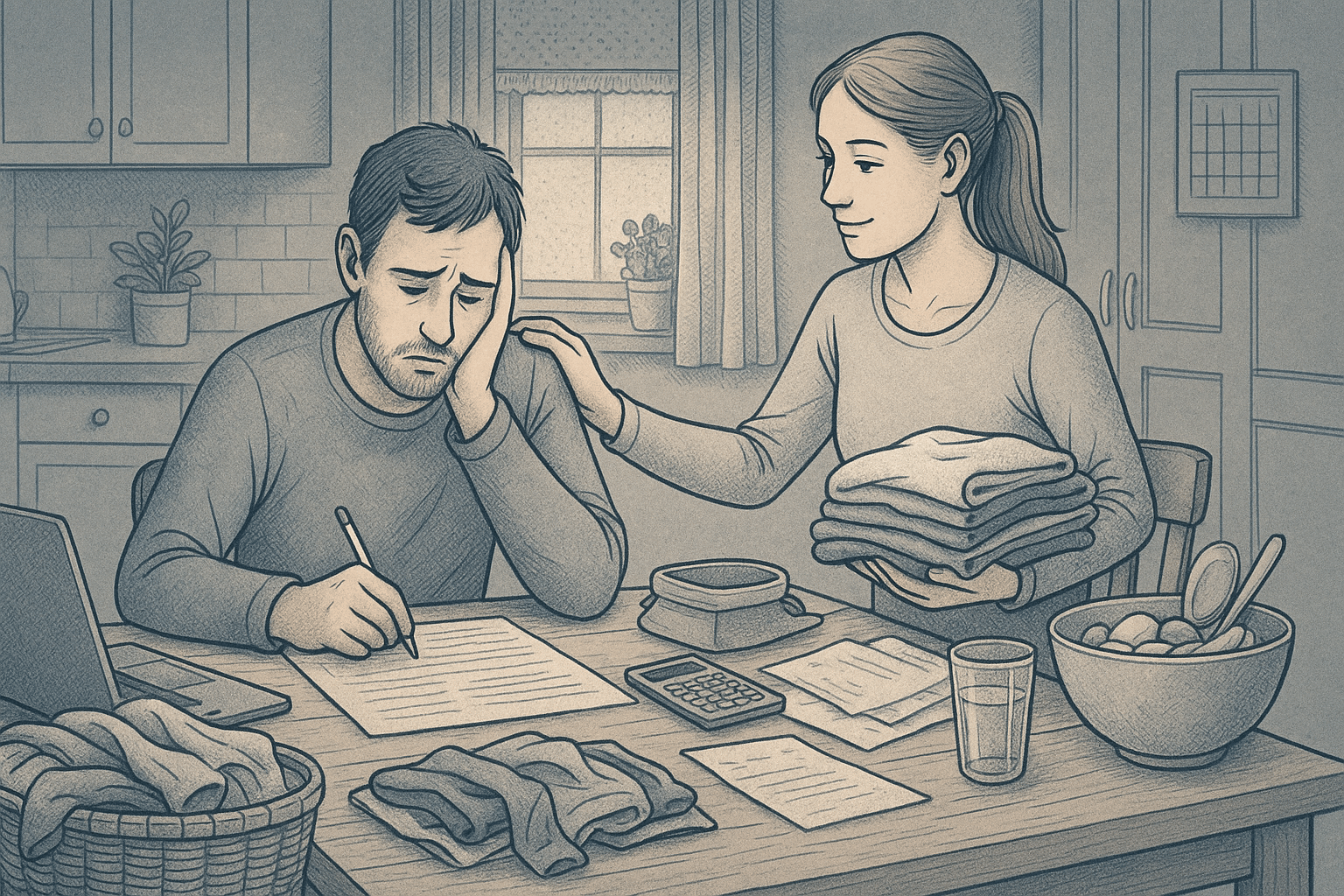Key Takeaways
- Effective communication with someone who has bipolar disorder requires understanding, patience, and avoiding invalidating statements like “everyone has mood swings sometimes.”
- Supportive phrases that validate feelings and offer specific help can strengthen your relationship with someone experiencing bipolar disorder.
- Communication approaches need to be adjusted depending on whether someone is experiencing a manic or depressive episode.
- AMFM provides specialized residential, partial hospitalization, and intensive outpatient programs for adults with conditions like ADHD, bipolar disorder, depression, and trauma. With facilities in California, Virginia, and Washington State, we prioritize a personalized, empathetic approach and make treatment accessible through broad insurance partnerships and tailored care plans.
What Happens in the Bipolar Brain? Understanding the Basics
Bipolar disorder involves real shifts in brain activity that affect how a person talks, feels, and reacts. During manic episodes, areas tied to reward and emotion become overstimulated, while impulse control weakens. This can lead to fast speech, racing thoughts, and irritability, so staying calm and clear helps.
In depressive episodes, brain activity drops in regions linked to motivation and pleasure. It becomes harder to focus or stay engaged, making simple, supportive communication more effective.
Understanding these brain patterns helps guide better conversations, based on what the person is actually experiencing at the time.
| A Mission For Michael: Expert Mental Health Care Founded in 2010, A Mission For Michael (AMFM) offers specialized mental health care across Southern California, Minnesota, and Virginia. Our accredited facilities provide residential and outpatient programs, utilizing evidence-based therapies such as CBT, DBT, and EMDR. Our dedicated team of licensed professionals ensures every client receives the best care possible, supported by accreditations from The Joint Commission and the California Department of Health Care Services. We are committed to safety and personalized treatment plans. Start your recovery journey with AMFM today! |
5 Supportive Things to Say to Someone with Bipolar Disorder
Finding the right words can provide meaningful support to someone navigating the complexities of bipolar disorder. The following phrases acknowledge their experience while offering genuine connection. Your tone of voice and body language are just as important as the words themselves; aim for sincerity rather than scripted responses.
1. “I’m here for you, no matter what phase you’re in”
People living with bipolar disorder often fear they’ll be judged or abandoned during intense mood swings. Saying this makes it clear you’re not going anywhere, even when things get tough. It reassures them that their value doesn’t change with their symptoms and that your relationship isn’t dependent on how well they’re managing each day. This kind of steady support can ease anxiety and remind them they’re still cared for, regardless of the phase they’re in.
2. “Your feelings are valid, even when they change”
This tells the person their emotional experience matters, even if it changes quickly or feels confusing. When someone hears their feelings are real and acceptable, no matter how often they change, it helps ease the shame or self-doubt that can come with bipolar disorder. Instead of trying to fix the emotion or question it, you’re offering space to feel it fully. That kind of validation builds trust and can help them feel less alone in their experience.
3. “Can I help you with anything specific today?”
This question does more than show support; it puts the person in control of what they need. Bipolar symptoms can make everyday tasks overwhelming, but they also vary from day to day. What feels helpful during one phase might feel intrusive during another. By asking what’s helpful right now, you’re showing respect and sensitivity. It also avoids guesswork and opens the door for meaningful help, without pressure.

Offering specific help puts the person in control of their support needs and respects how bipolar symptoms can make different types of assistance feel helpful or overwhelming from day to day.
4. “I believe you’re doing the best you can”
Many people with bipolar disorder deal with intense self-criticism, especially when they struggle to meet their own expectations. This simple phrase reminds them that effort doesn’t always look like progress, and that trying to manage symptoms is already a huge task. You’re not excusing harmful behavior, but you’re recognizing how hard they’re working to cope, which helps reduce guilt and boosts their resilience over time.
5. “Would you like to talk about it or would you prefer a distraction?”
Sometimes the best support is offering a choice. Talking helps process emotions, but there are also times when someone needs a break; something light to take their mind off things. This question gives them the freedom to decide what feels helpful in the moment. It also shows that you’re comfortable with whatever they choose, and that you’re there either way, ready to listen or just be a calm presence while they regroup.
4 Phrases to Never Say to Someone with Bipolar Disorder
Even with the best intentions, certain statements can invalidate, stigmatize, or damage your relationship with someone who has bipolar disorder. Understanding what not to say is just as important as knowing supportive phrases. The following statements, though sometimes well-intentioned, can cause significant harm and erode trust.
1. “Everyone has mood swings sometimes”
Equating bipolar disorder with typical mood changes completely overlooks the reality of the condition. These are not just emotional highs and lows; they’re intense, often debilitating states that disrupt daily life and usually need medical treatment. When you say this, it can make someone feel dismissed, as if their experience is exaggerated or attention-seeking. It also ignores the medical and neurological complexity behind bipolar disorder, reducing it to a personality quirk rather than a real health issue.
2. “You’re acting crazy/psycho”
Words like “crazy” or “psycho” carry deep stigma and can be especially damaging for someone managing a mood disorder. They strip away the person’s humanity and reinforce the false idea that their symptoms are just bad behavior. Even if said jokingly or out of frustration, this kind of language cuts deep. It increases shame, feeds internalized stigma, and can actually push someone away from seeking help when they need it most. Bipolar disorder, especially when it includes psychosis, deserves serious, respectful language, not insults masquerading as commentary.
3. “Have you taken your medication?”
While staying on medication is important, this question can feel accusatory, especially during a tough episode. It implies that any distress is their fault for being noncompliant, when in truth, bipolar symptoms can emerge even with perfect adherence. This question often shuts down real conversation. Instead of jumping to conclusions, it’s better to ask how they’re feeling or if they want support. That keeps the focus on connection, not blame.
4. “You were fine yesterday, what’s wrong now?”
This question demonstrates a fundamental misunderstanding of the cyclical, episodic nature of bipolar disorder. Rapid mood shifts are a hallmark symptom of the condition, not a character flaw or choice. The implication that consistency is expected fails to acknowledge that unpredictable mood changes are literally a defining feature of the disorder, not something the person can simply explain or control.
Your Healing Journey Begins Here at AMFM

Every AMFM space is built for comfort, connection, and calm, so you can focus on what matters most: healing.
At AMFM, healing starts with understanding, support, and care that’s built around your experience. Our team works closely with adults dealing with ADHD, bipolar disorder, depression, trauma, and more, creating personalized care plans that evolve with you.
We don’t take a one-size-fits-all approach. Right from the first conversation, we get to know your background and what you need. Our clinicians help with everything, including insurance options, and we provide a calm, comfortable space where you can focus fully on recovery.
Each location, California, Virginia, and Washington State, is designed for peace and privacy. You’ll get expert support through residential, partial hospitalization, or intensive outpatient care, depending on what fits you best.
Paying for treatment shouldn’t be a roadblock. We work with major insurance providers and most PPO plans, often covering the full cost after your deductible. Our team handles the details quickly and clearly, and we also offer flexible private pay options.
What makes AMFM different is how we show up, for you and your family. We stay connected throughout the process, offering expert care and real compassion, from the first day through long-term follow-up.
If you or someone close to you is facing mental health challenges, give us a call at 866-478-4383. The path forward starts here, and we’re ready to walk with you every step.
Frequently Asked Questions (FAQ)
How do I encourage someone with bipolar disorder to seek treatment?
Bring up the conversation during a calm period, not during a mood episode. Use “I” statements to share what you’ve noticed, like “I’ve seen you’re not sleeping much lately, and I’m a little worried.” Offer help with things like researching providers or scheduling an appointment. If they’re hesitant, ask about their concerns. Fears about side effects, stigma, or losing creativity are common. Listen first, then gently provide information. However, the decision to get help is ultimately theirs. Pushing too hard can make them pull away.
Can I prevent a bipolar episode through communication?
Good communication can help reduce stress and spot early warning signs, but it can’t fully prevent episodes. Bipolar disorder is rooted in biology; factors like brain chemistry and genetics play a big role. Still, healthy communication matters. It works best as part of a full support plan that includes therapy, medication, structure, and awareness of triggers. Family-focused therapy, in particular, has been shown to boost outcomes when added to treatment.
Should I treat someone differently when they have bipolar disorder?
You don’t need to tiptoe around them, but some adjustments help. Clearer communication, flexibility with plans, and more check-ins during stressful times can go a long way. The goal isn’t to lower expectations, but to balance empathy with boundaries. If symptoms affect behavior, acknowledge it without excusing harm. Supporting someone includes holding space for them and encouraging responsibility for their wellbeing.
How do I respond when someone with bipolar disorder pushes me away?
It’s normal for someone to withdraw during depression or become short-tempered during mania. Let them know you’re still there without adding pressure: “I get that you need space, I’m here whenever you’re ready.” Keep checking in with simple, low-effort messages. If distance becomes a pattern that strains the relationship, talk about it during a calmer time. Focus on how it affects you, not on labeling their behavior.
What makes AMFM the best choice for adult mental health treatment?
AMFM stands out for our deeply compassionate, evidence-based care, personalized treatment planning, and experience supporting adults with ADHD, bipolar disorder, and related conditions. Our peaceful residential settings, comprehensive coverage with insurance providers, and continuous support from assessment through recovery ensure the most nurturing path to lasting wellness.






